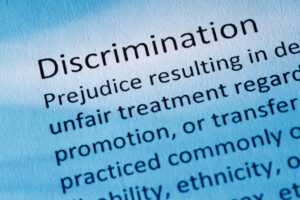Sex and gender discrimination in the workplace can take many forms—from being passed over for a promotion to enduring offensive comments or unfair treatment based on your identity. California law prohibits discrimination based on sex, gender identity, gender expression, or sexual orientation. But to hold an employer accountable, evidence is key. Understanding how to recognize discrimination and collect proof is an important first step toward protecting your rights.
Recognizing Sex and Gender Discrimination at Work
Discrimination may be subtle or overt, but in either case, it’s illegal when it affects the terms, conditions, or privileges of employment.
Common Examples of Discrimination
- Being paid less than a coworker of another gender for the same work
- Denied promotions or training based on sex or gender identity
- Harassment such as inappropriate jokes, slurs, or offensive comments
- Unequal discipline or performance reviews
- Dress code enforcement that targets or disadvantages certain gender expressions
- Termination or demotion following pregnancy, gender transition, or complaints of discrimination
If you’ve experienced any of these situations, it’s possible your rights have been violated.
Why Evidence Matters
Proving discrimination often involves showing a pattern of behavior or a decision-making process that unfairly targeted you because of your sex or gender. Employers may deny discrimination or offer alternative explanations, so solid documentation is critical to support your claim.
How to Build Your Case with Evidence
Start gathering evidence as soon as you suspect discrimination. Even if you’re not ready to take legal action, having a record of events can protect you if things escalate.
Key Types of Evidence to Collect
- Emails, messages, or memos: Save written communications that show discriminatory language, behavior, or decisions.
- Performance reviews: Keep copies of evaluations that reflect sudden or unjustified changes, especially after a complaint.
- Pay stubs and job descriptions: These help demonstrate disparities in compensation or job duties between you and coworkers.
- Witness statements: If coworkers witnessed incidents or experienced similar treatment, their accounts can support your claim.
- Timeline of events: Write down what happened, when, who was involved, and how it affected your job. Be as detailed and factual as possible.
Additional Documentation
- HR complaints: Make note of any complaints you filed and how your employer responded.
- Company policies: Save copies of employee handbooks or workplace policies related to discrimination, pay, and promotion practices.
What to Do After Gathering Evidence
Once you’ve collected evidence, it’s time to evaluate your next steps.
- Review the facts: Look for patterns that indicate unequal treatment tied to your sex or gender.
- Consider reporting internally: If you feel safe doing so, report your concerns to HR or a supervisor. This step is not required, but in some cases, it may resolve the issue or create an additional record of your efforts.
- Seek legal guidance: An experienced employment attorney can assess your evidence, explain your rights, and guide you through the process of filing a claim.
PLBH is here to help employees who’ve experienced sex or gender discrimination pursue justice. Whether you’re preparing to file a complaint or need help understanding your legal options, PLBH offers knowledgeable support every step of the way. Call (800) 435-7542 for a confidential consultation.
Taking Timely Action Matters
Discrimination claims are subject to deadlines. In California, employees typically have a limited time to file a complaint with the Civil Rights Department (formerly DFEH). The sooner you act, the stronger your case will be—and the better chance you’ll have to preserve important evidence and protect your rights.
You Don’t Have to Navigate This Alone
Experiencing discrimination can leave you feeling isolated, frustrated, and unsure of what to do. But you have the right to a workplace free of bias, harassment, and unfair treatment. With the right support and a well-documented case, you can hold your employer accountable and pursue the justice you deserve.
If you believe you’ve experienced sex or gender discrimination at work, contact PLBH at (800) 435-7542 to learn how we can help.

